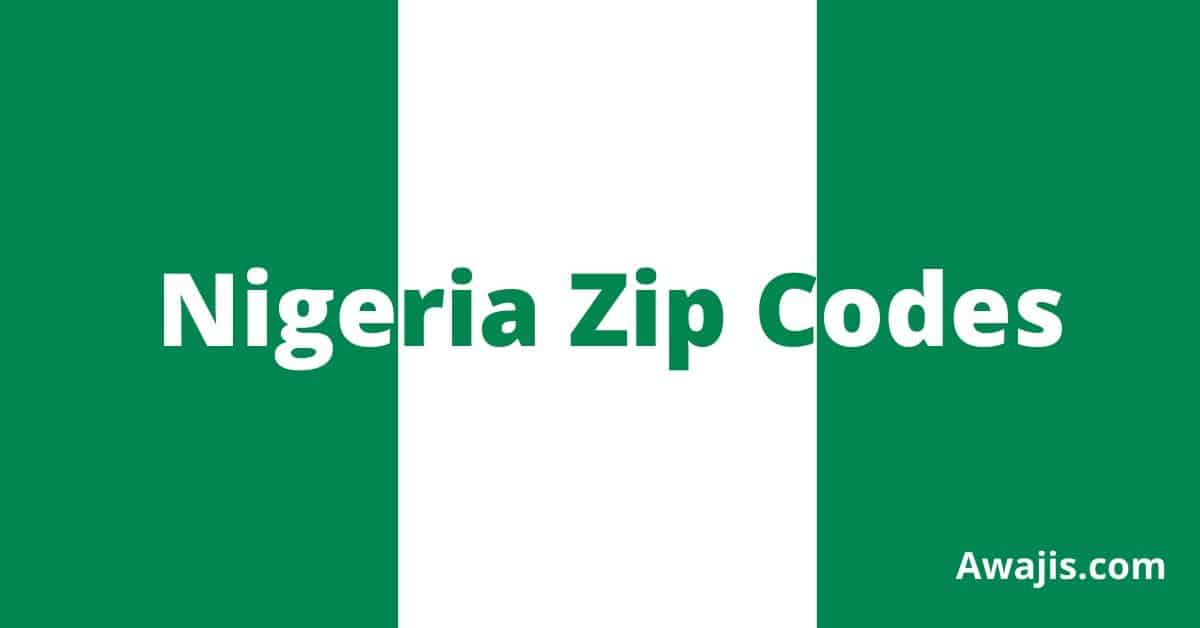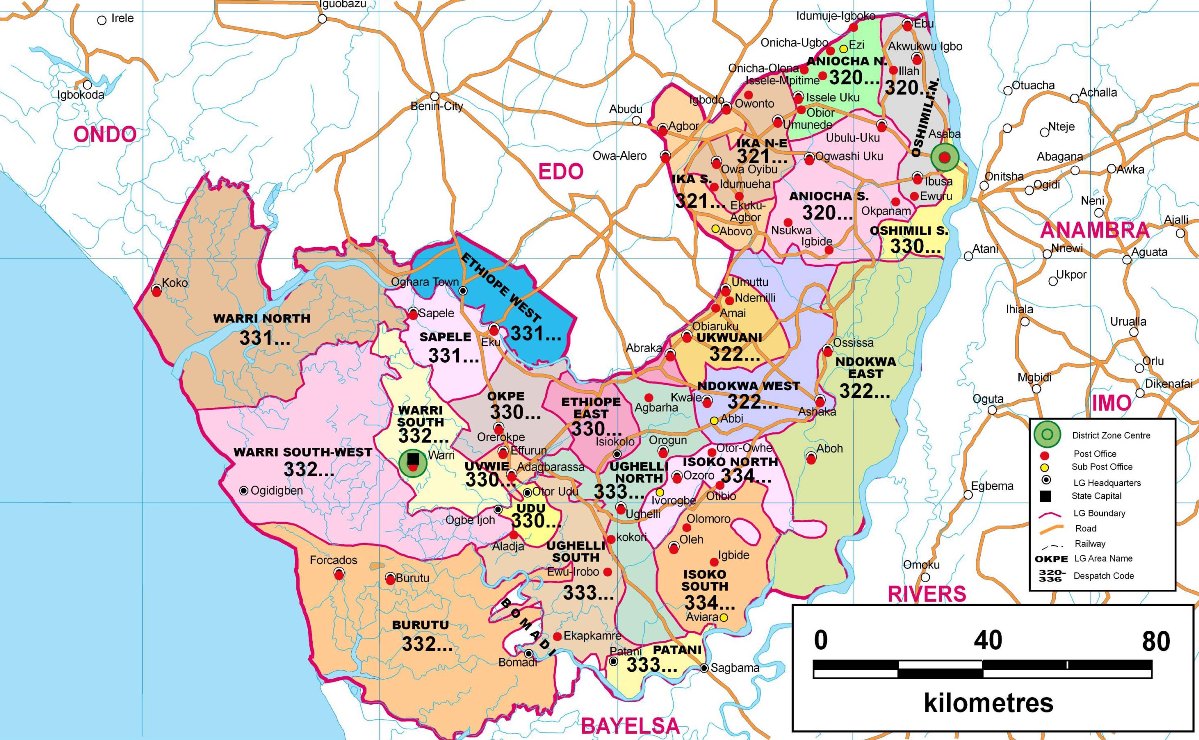So, you’ve landed here because you’re curious about Nigeria ZIP codes. Great! Let me tell you, navigating postal systems in Nigeria can feel like solving a puzzle, but don’t worry—we’ve got you covered. Whether you’re planning to send a package, order something online, or simply want to understand how postal codes work in this vibrant country, this article will break it all down for you. So, buckle up, and let’s dive into the world of Nigerian ZIP codes!
Now, before we get into the nitty-gritty, let’s address the elephant in the room: what exactly is a Nigeria ZIP code? Simply put, it’s a numerical code used by the Nigerian Postal Service (NIPOST) to make sure mail and packages reach their intended destinations without any hiccups. But there’s more to it than just numbers, and that’s where things start getting interesting.
Here’s the deal: Nigeria’s postal system has evolved over the years, and with that evolution comes some quirks that might leave you scratching your head. From regional differences to formatting specifics, we’ll cover everything you need to know to avoid any postal mishaps. Stick around, and by the end of this article, you’ll be a pro at understanding Nigeria ZIP codes.
Read also:Why Oona Obriens Feet Are Stealing The Spotlight A Deep Dive
What is Nigeria ZIP Code All About?
Understanding the Basics of Nigerian Postal Codes
Alright, let’s break it down. A Nigeria ZIP code is essentially a set of numbers assigned to specific areas within the country. These codes help postal services like NIPOST sort and deliver mail more efficiently. Think of it as a digital address that tells the post office exactly where your package or letter needs to go.
But here’s the kicker: unlike countries like the USA, where ZIP codes are usually five digits, Nigerian postal codes can vary in length. Some regions use four-digit codes, while others use six. Confusing, right? Don’t worry, we’ll clarify all that in a bit. For now, just remember that these codes play a crucial role in ensuring your mail doesn’t get lost in transit.
How Nigeria ZIP Codes Work
Now that we know what they are, let’s talk about how they function. When you send a letter or package, the postal code acts as a guide for the post office. It tells them which region, city, or even neighborhood your mail is destined for. Without it, your package might end up taking a scenic route—or worse, getting lost entirely.
Here’s a fun fact: Nigeria’s postal system is divided into zones, each with its own set of codes. For example, the Federal Capital Territory (FCT) has its own unique codes, just like Lagos, Abuja, and other major cities. This zoning system helps streamline the delivery process, making it faster and more efficient.
Why Are Nigeria ZIP Codes Important?
Ensuring Accurate Delivery
Imagine this: you’re ordering a gift online for a friend in Nigeria, and you accidentally leave out the postal code. What happens next? Chances are, the package gets delayed—or worse, it never reaches its destination. That’s why having the correct Nigeria ZIP code is so crucial. It’s like giving your mail a GPS system that ensures it gets where it needs to go.
And let’s not forget about businesses. If you’re running an e-commerce store or managing logistics, accurate postal codes can mean the difference between a satisfied customer and a frustrated one. In today’s fast-paced world, efficiency is key, and Nigeria ZIP codes play a big part in that.
Read also:Nigerian Actors Pictures And Names A Journey Through Nollywoodrsquos Stars
Aiding Online Transactions
With the rise of online shopping, Nigeria ZIP codes have become even more important. Many e-commerce platforms require them during checkout to ensure accurate shipping estimates and delivery addresses. Without the right code, your order might end up in the wrong hands—or worse, not arrive at all.
So, whether you’re shopping for yourself or managing a business, having the correct postal code is a must. It’s not just about convenience; it’s about reliability and trust in the delivery process.
How to Find Your Nigeria ZIP Code
Using NIPOST’s Official Website
One of the easiest ways to find your Nigeria ZIP code is by visiting the official NIPOST website. They have a handy search tool that lets you input your city or town, and voila! It’ll provide you with the corresponding postal code. Simple, right?
But here’s the thing: not everyone has access to the internet, especially in more rural areas. That’s where local post offices come in. If you’re ever unsure about your postal code, a quick visit to your nearest post office can clear things up in no time.
Third-Party Tools and Apps
Of course, if you’re tech-savvy, there are plenty of third-party tools and apps that can help you find your Nigeria ZIP code. Just be sure to use reputable sources to avoid any misinformation. Some popular options include postal code lookup websites and mobile apps specifically designed for Nigerian users.
And hey, if all else fails, you can always ask a local. Nigerians are known for their hospitality, and chances are, someone in your community will be happy to lend a hand.
Common Misconceptions About Nigeria ZIP Codes
Myth #1: All Nigerian Postal Codes Are Six Digits
Wrong! While some regions do use six-digit codes, others stick to four. The length of the code depends on the specific area and its zoning system. So, if you’re ever unsure, double-check before sending anything out.
Myth #2: Nigeria ZIP Codes Are the Same as USPS ZIP Codes
Not even close. While both systems use numerical codes to aid in mail delivery, they operate independently and have different formats. Trying to use a USPS ZIP code in Nigeria (or vice versa) will only lead to confusion and delays.
Myth #3: You Don’t Need a Postal Code for Local Deliveries
Wrong again! Even for local deliveries within the same city, having the correct postal code is essential. It helps postal workers sort and distribute mail more efficiently, reducing the chances of errors or delays.
Regional Differences in Nigeria ZIP Codes
Postal Codes in Major Cities
Let’s take a closer look at how postal codes vary across Nigeria’s major cities. For instance, Lagos, being the commercial hub, has its own set of codes that differ from those in Abuja, the capital. Here’s a quick breakdown:
- Lagos: Typically uses four-digit codes, such as 100001 for Victoria Island.
- Abuja: Often uses six-digit codes, like 900101 for the Central District.
- Kano: Uses four-digit codes, with 700001 being common for central areas.
As you can see, the format and length of postal codes can vary significantly depending on the region. That’s why it’s always a good idea to double-check before sending anything out.
Rural vs. Urban Areas
Another interesting aspect of Nigeria ZIP codes is the difference between rural and urban areas. In cities, postal codes are often more standardized and easier to find. However, in rural areas, things can get a bit more complicated. Some villages might share the same code, while others might not have one at all.
This is where community post offices come in handy. They act as central hubs for mail delivery in remote areas, ensuring that everyone gets their letters and packages, even if they don’t have an official postal code.
Tips for Using Nigeria ZIP Codes Effectively
Double-Check Your Code
One of the most common mistakes people make is assuming they know their postal code without verifying it. Always double-check before filling out forms or sending mail. A simple typo can lead to delays or even lost packages.
Stay Updated
Postal systems evolve over time, and Nigeria is no exception. New codes might be introduced, or existing ones might change. Staying updated with the latest information ensures you’re always using the correct code.
Communicate with Recipients
If you’re sending mail to someone in Nigeria, it’s always a good idea to communicate with them beforehand. Confirm their postal code and delivery address to avoid any mix-ups. After all, clear communication is key to successful deliveries.
Future Developments in Nigeria’s Postal System
Technological Advancements
As technology continues to advance, so does Nigeria’s postal system. We’re seeing more digital solutions being implemented to improve efficiency and accuracy. From online tracking systems to automated sorting machines, the future looks bright for Nigerian postal services.
Expanding Coverage
Another exciting development is the expansion of postal coverage to more remote areas. Efforts are being made to ensure that even the most rural communities have access to reliable postal services. This not only improves communication but also boosts economic opportunities for these regions.
Conclusion
So, there you have it—a comprehensive guide to understanding Nigeria ZIP codes. From their importance in ensuring accurate deliveries to the regional differences that make them unique, we’ve covered everything you need to know. Remember, whether you’re sending mail locally or internationally, having the correct postal code is essential.
Now, here’s the call to action: if you found this article helpful, feel free to share it with others who might benefit from it. And don’t forget to leave a comment below with any questions or feedback you might have. Let’s keep the conversation going and help each other navigate the world of Nigerian postal codes!
Table of Contents:
- What is Nigeria ZIP?
- Understanding the Basics of Nigerian Postal Codes
- How Nigeria ZIP Codes Work
- Why Are Nigeria ZIP Codes Important?
- How to Find Your Nigeria ZIP Code
- Common Misconceptions About Nigeria ZIP Codes
- Regional Differences in Nigeria ZIP Codes
- Tips for Using Nigeria ZIP Codes Effectively
- Future Developments in Nigeria’s Postal System
- Conclusion
Data Sources: NIPOST Official Website, Nigeria Postal Service Guidelines, TechCrunch Nigeria, BBC News Nigeria


